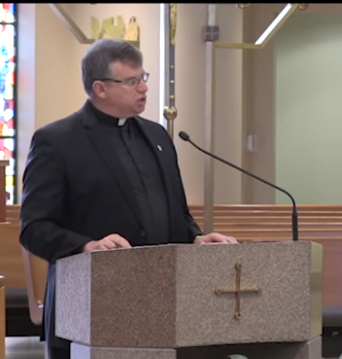 Fr. Pat Griffin reflects on proclamation to “The Ends of the Earth”
Fr. Pat Griffin reflects on proclamation to “The Ends of the Earth”
[Jesus said:] “You will receive power when the holy Spirit comes upon you, and you will be my witnesses in Jerusalem, throughout Judea and Samaria, and to the ends of the earth.” (Acts 1:8)
The first reading of the Eucharist during the Easter Season reports on the growth of the Church. The Acts of the Apostles relates the adventures of Stephen, Philip, and Barnabas as well as Peter and Paul, but it does not aim to offer a biography of these men. People are sometimes surprised that, at its conclusion, Acts lacks a story of the death of Paul. It would have been so easy to include, but the last lines have a different purpose:
[Paul] remained for two full years in his lodgings. He received all who came to him, and with complete assurance and without hindrance he proclaimed the kingdom of God and taught about the Lord Jesus Christ. (Acts 28:30-31)
This indicates the program of the biblical text. It does not lionize the preachers, but celebrates the spread of the Gospel through these good men. The disciples received the commission at the beginning of the book to proclaim the Gospel from Jerusalem “to the ends of the earth.” Rome represents that goal. When Paul witnesses to Jesus in the capital of the empire, the Book has achieved its purpose.
As I listen to the accounts in Acts, the courage and the resiliency of the proclaimers stand forth clearly. To speak the Word, the missionaries overcome all sorts of difficulties and challenges. Followers of the Way witness to their belief with their lives as well as their freedom. No venue remains unexplored. One of my favorite stories has Paul in chains before the Roman powers, and he takes advantage of the opportunity to preach even then:
Then Agrippa said to Paul, “You will soon persuade me to play the Christian.” Paul replied, “I would pray to God that sooner or later not only you but all who listen to me today might become as I am except for these chains.” (Acts 26:28-29)
Wow. Nothing dissuades Paul from his mission or persuades him to move offstage.
The proclamation of the Gospel to the “ends of the earth” has significant application for Vincentians and consecrated persons. These extremities, however, move outside of geographical boundaries into wider contexts.
If we speak about our society, we can locate the extremities not simply in the acceptance or rejection within the religious sphere, but where they can be found in politics, in economic decisions, and in attitudes around immigration, equality, and peace. The Gospel speaks to each of these spheres and, when it is heard as well as proclaimed, it can make a great difference for our world. The invitation is for individuals—whatever their occupation or importance—to witness to what they believe and to allow this testimony to change our society to its very edges and furthest reaches.
If we speak about our families and communities, we can imagine the ways in which the ends might be found in frequent, unembarrassed professions of love and care. Forgiveness and reconciliation always need to define our closest relationships as well as those with acquaintances. Hope and encouragement, despite concerns arising from various alternatives, challenge the position which sees no newness or possibilities. Within the family/community, the willingness to foster a deeper heedfulness for the good of the other points to the goal of the Gospel.
When we look within, the “ends” necessarily become personal and extend across our whole self. The Good News needs to take hold of us completely. Rather than having “ends,” however, sometimes we are more comfortable with “limits.” To pursue a virtue or a practice to the fullness of our ability would involve so much change of heart and adjustment of perspective, that we could exhaust ourselves. Our conversion could spur us to a reformation which left little room for the old self. When we give ourselves completely to our mission, we would find less time for other pursuits which provide distractions more than ministry. If we sought the borders of our conversations and tried to adjust them in relation to the Gospel, we might find ourselves quieter and more reflective on what we say.
Seeing to proclaim the Good News to the very “ends” of our world requires the energy and commitment demonstrated by the first Christians in the Acts of the Apostles. They never hesitated in taking the next step or engaging the last opportunity. As Vincentians, the ends of our world bring us to the place where we serve the most abandoned. In everything, we embrace a closer following of Christ and making him known. As consecrated persons, we follow the model of the first disciples, by dedicating ourselves faithfully to the proclamation of the kingdom of God and to teaching about the Lord Jesus Christ







0 Comments